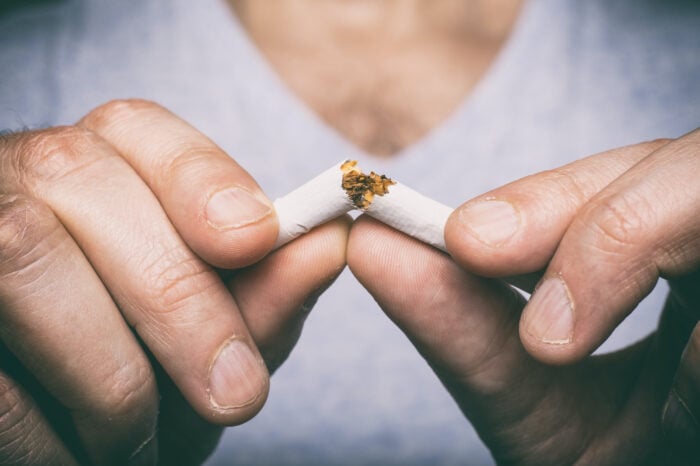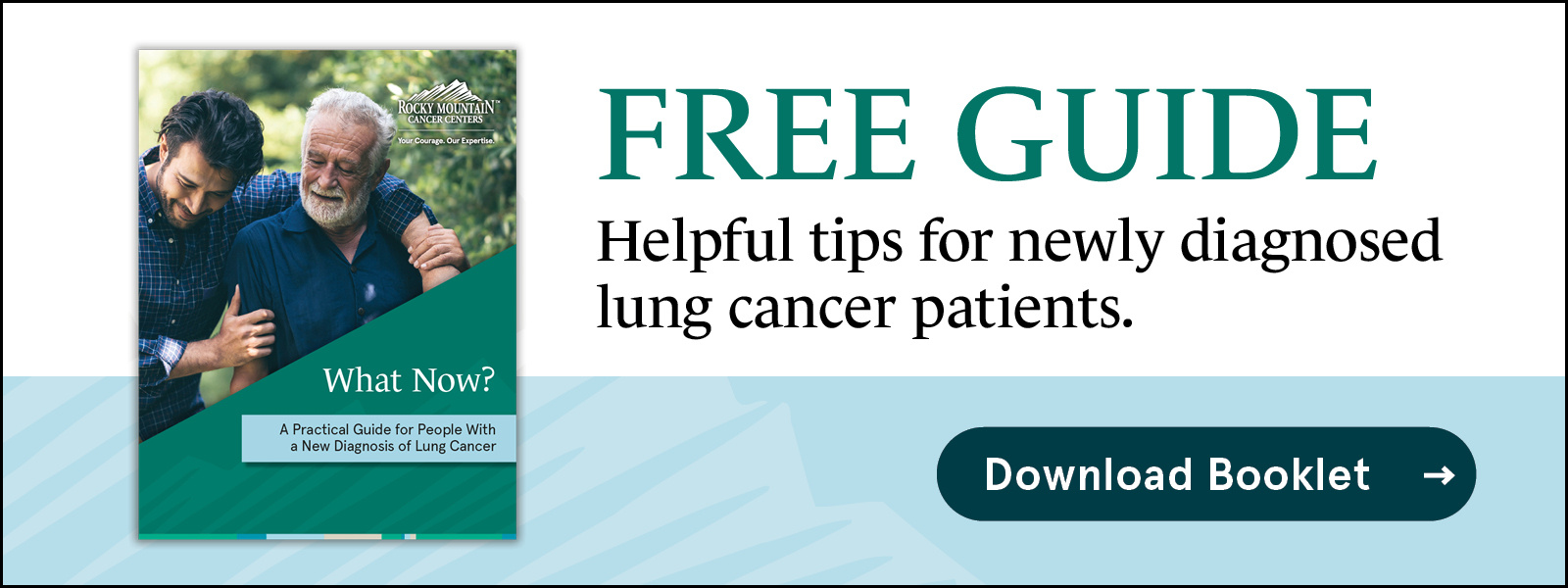Here’s What You Need to Know About Smoking and Lung Cancer
6 min read

While those who never smoked or lived with a smoker can get lung cancer, medical research has clearly established that smoking is the leading cause of lung cancer. In addition, people who are exposed to second-hand smoke are also at risk for developing lung cancer. Read on to find out what you need to know about the relationship between smoking and lung cancer.
Smoking: The primary risk factor for lung cancer
The number one risk factor for developing lung cancer is tobacco smoke, whether you smoked in the past or are a current smoker. Eighty to ninety percent of people who die from lung cancer have a history of smoking. Using other types of tobacco such as cigars or pipes also increases the risk of lung cancer, says the CDC. And people who smoke cigarettes are 15-30 times more likely to develop lung cancer than people who don’t smoke. If you currently smoke or you have in the past, see if you're eligible for lung cancer screening. Finding lung cancer at its earliest stages through screening makes it easier to treat and with better outcomes.
Secondhand smoke also increases lung cancer risks
Consistent exposure to second-hand smoke is the second biggest risk factor for developing lung cancer. At least 70 of the 7,000 chemicals, the CDC explains, are toxins that cause cancer in animals and humans. And according to the American Cancer Society, secondhand smoke causes over 7,000 deaths to cancer each year.
Some smoking myths associated with lung cancer
Smoking is a lifestyle and for most people, it can be a difficult habit to break. As a result, there are a lot of myths circulating which individuals use to rationalize why it is not worth it to stop smoking. The truth is, however, that these are just myths — and if you are a smoker, you should stop smoking now for the sake of your health, no matter how long you have been smoking. Here are just a few of the myths out there that make people think twice before they stop smoking.
1. “If you don’t smoke, you won’t get lung cancer.”
Twenty percent of people (one out of five) with lung cancer do not smoke or have never smoked. And because many factors can contribute to lung cancer in a person, particularly toxins in the environment and genetic or inherited predisposition to the disease, you can still get lung cancer if you are a non-smoker. So taking care of your lungs and being aware of the quality of the air you and your loved ones breathe is essential. Learn more in our blog about lung cancer in non-smokers.
2. “Why bother to stop smoking since it won’t reduce my risk of lung cancer?”
Research shows that you can reduce the risk of lung cancer if you stop smoking. If you already have lung cancer, you should quit immediately to help stop the spread of the disease, reduce inflammation in the lungs, and minimize the amount of stress that smoking places on your body.
3. “E-cigarettes and vaping can’t harm your lungs.”
Yes, they can, says John Hopkins Medicine. While e-cigarettes present less of a risk for lung cancer than regular smoking, medical experts and the public recently learned that vaping can cause its own kind of major harm. As of January of 2020, the CDC reported 60 incidents where vapers fell gravely ill. The CDC isolated Vitamin E acetate as “a chemical of concern” for the condition that is now identified as EVALI (e-cigarette or vaping use associated lung injury).
4. “I’m a smoker, but I’m too young to get lung cancer.”
John Hopkins Medicine reports that the age of the average person in the US is 70. However, each year brings about 30,000 new diagnoses of lung cancer for people under 50 — and an estimated 21,000 of those patients will die of lung cancer.
5. “Nicotine replacement therapies such as patches can cause cancer.”
According to Johns Hopkins Medicine, there are no known studies that link nicotine replacement therapy to cancer. Furthermore, nicotine patches are an effective method for helping you cut down or stop smoking. Since your risk of lung cancer increases with the number of years you smoke and the more cigarettes you smoke each day, quitting smoking at any time can reduce your risk of lung cancer.
Tips to stop smoking
Experts have been studying how to quit smoking effectively for years. So once you have made the decision to stop and seek reliable help, you will find an abundance of scientifically proven ways to help you quit. Here are some tips:
Consult your doctor about a plan to stop smoking.
Your health care provider will have advice for you to help you stop smoking. They may also write you a prescription for a medicine designed to reduce the craving for tobacco. A common prescription is varenicline, which, when used as directed and combined with counseling, education, and support, it can be an effective vehicle for quitting.
Use nicotine replacement therapy (NRT).
If your doctor does not prescribe you medicine to reduce your cravings, ask which nicotine replacement products they recommend. Nicotine replacement therapy includes gums, lozenges, patches, sprays, and inhalers which can help lessen your cravings and withdrawal symptoms. With counseling or other types of support, NRT has proven to be effective.
The Colorado QuitLine and Tobacco Free Colorado will supply all Colorado residents, over the age of 15, with free nicotine replacement therapy resources, such as nicotine gum and patches. They also provide counseling.
Seek smoking cessation counseling.
Smoking is a difficult habit to break, and it’s virtually impossible to go it alone. Seek out a professional addiction counselor to get support while you take on this challenge.
Enlist the support of friends and family.
Your immediate circle of friends and loved ones can really make the difference when you share your goal to stop smoking with them. If they smoke, ask them to try not to smoke around you. And if they don’t smoke, they will definitely appreciate your new smoke-free environment. They may also find ways to encourage you to meet your goals.
Join online support groups.
An online support group for smokers who are trying to quit gives you a community of like-minded individuals who are going through the same struggle. They will have tips on what works and what doesn’t so that you don’t have to reinvent the wheel.
Use stop-smoking support hotlines.
The Colorado QuitLine provides smoking cessation counseling and is staffed by counselors who have been trained to help smokers stop smoking. You can reach Colorado’s Quitline and find out their days and hours of operation by calling 800-798-8669 (or 800-QUIT-NOW).
You can also chat with a National Cancer Institute LiveHelp information specialist between 9 am and 9 pm from Monday through Friday.
Follow stop-smoking guidebooks.
There are several reputable e-guidebooks you can access online, or you can purchase a guide online and have a hard copy sent to you. Here is a guidebook which you can download for free: How to Stop Smoking by Mike Reeves-McMillan.
Use a quit-smoking app.
Lastly, Healthline provides a list of the best apps for 2019 to help you stop smoking. Some of the top apps include My Quit Coach, Cessation Nation, Kwit, and Quit Now! Depending upon the app, you can keep track of the daily money you saved by not smoking, log and track your cravings, and/or be a part of an online community that uses the app and shares the same struggles.
Other Lung Cancer Risk Factors
Having a smoking history and breathing in second-hand smoke are the top causes of lung cancer. However, it’s still possible to develop lung cancer without ever smoking or without having been exposed to second-hand smoke. Other risk factors for developing lung cancer include genetics and family history, some dietary supplements, exposure to radon or to asbestos, air pollution, and specific airborne carcinogens that can be inhaled.
Rocky Mountain Cancer Centers specializes in providing the most effective care to cancer patients and promoting the latest in cancer education. We have centers at over fifteen locations throughout Colorado — including Denver, Colorado Springs, the Aurora-Boulder area.
If you’re interested in cancer education or would like to make an appointment, find a Rocky Mountain Cancer Centers location near you.
-- Updated October 2023
